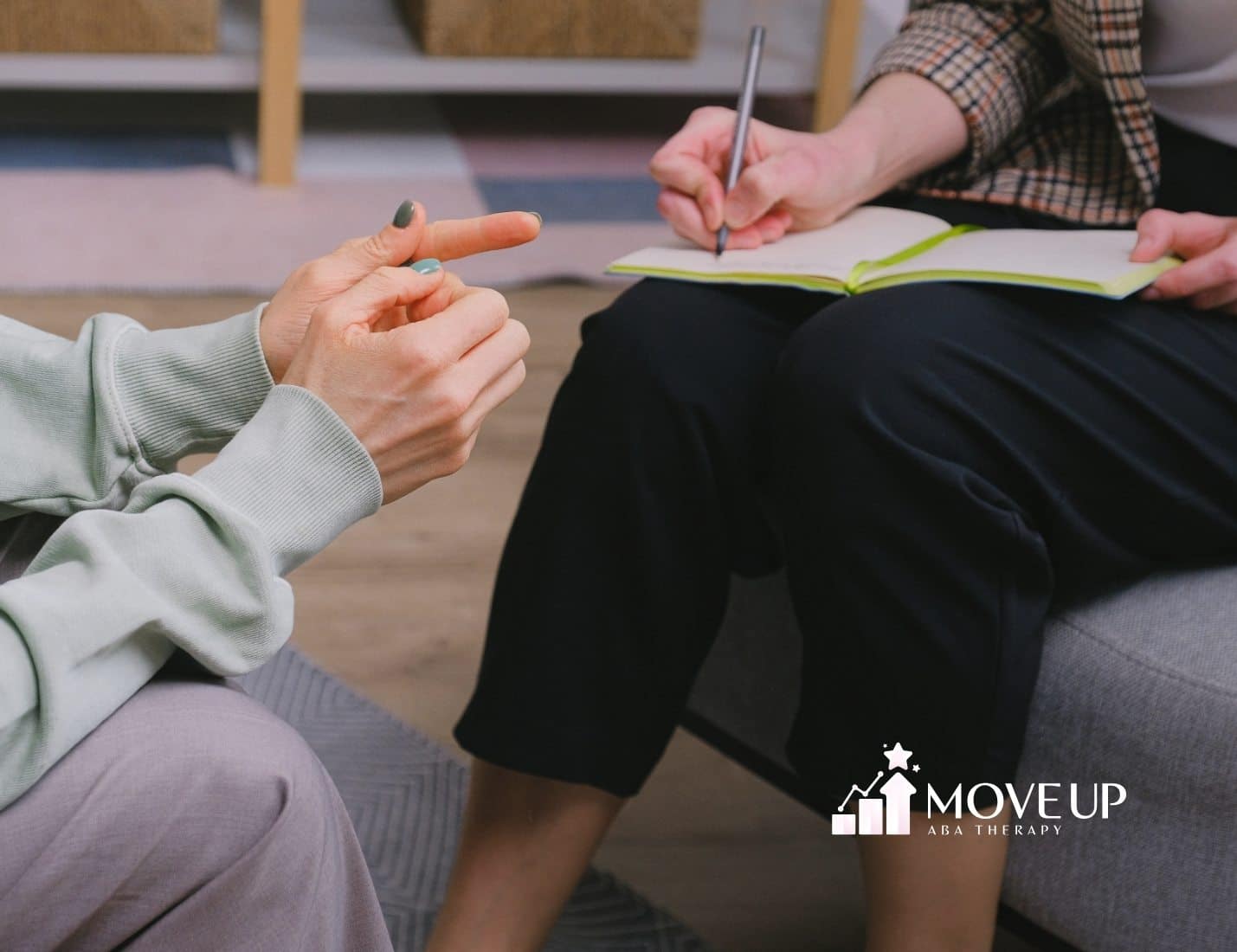The importance of sleep cannot be understated when it comes to our well being affecting not our physical health but also our mental and emotional states. Research has delved into how sleep influences behavior with Applied Behavior Analysis (ABA) offering insights, into this connection in applied behavior analysis services.
ABA, a method for studying behavior and its environmental influences highlights the role of sleep in shaping how we act and react. This article delves into the relationship between sleep and behavior through an ABA lens emphasizing the impact of healthy sleeping habits on our daily behaviors and general wellness.
Success Stories
“Move Up ABA has been a lifeline for our family. Before starting therapy, our son struggled with daily routines and communication. Now, he’s more independent and even initiated a conversation with a classmate for the first time! The progress we’ve seen in just six months is truly remarkable.”
- Emily R., Silver Spring, Accountant
“As a single dad, I was overwhelmed trying to manage my child’s behavior. The Move Up ABA team not only provided amazing support for my little girl but also taught me practical strategies to use at home. Their in-home sessions fit perfectly with our busy schedule. I’m so grateful for their patience and expertise.”
- Michael T., Rockville, Middle School Teacher
“We were hesitant about starting ABA therapy, but Move Up ABA’s approach put us at ease from day one. Our twins have made incredible strides in their social skills and self-regulation. The therapists are like extended family now, and we couldn’t be happier with our decision to work with them.”
- Aisha and James L., Simpson, Police Officers
Understanding Behavior through ABA
In the realm of ABA behavior is viewed as learned and changeable through methods. It stresses the importance of observing behaviors in context analyzing factors and implementing strategies to foster changes. Within this framework sleep emerges as an element that shapes behavior outcomes.
Sleep Deprivation and Behavior

The detrimental effects of sleep on behavior are widely recognized. Inadequate rest can disrupt functions impair decision making skills and affect regulation. Practitioners in ABA often encounter situations where disturbances in sleep significantly influence behaviors in individuals with conditions, like autism spectrum disorder (ASD) or attention deficit/hyperactivity disorder (ADHD).
Linking Sleep Patterns to Behavioral Changes
ABA strategies often involve meticulous data collection and analysis. Observing sleep patterns alongside behavioral changes provides valuable insights into the correlation between sleep and conduct. For instance, disruptions in sleep routines might coincide with increased cases of challenging behaviors in individuals undergoing ABA therapy. Identifying these patterns enables tailored interventions addressing both sleep disturbances and subsequent behavioral challenges.
Sleep Hygiene: A Key Component in Behavior Modification
In the realm of ABA, promoting good sleep hygiene is integral to fostering positive behavioral changes.
Establishing consistent bedtime routines, creating conducive sleep environments, and teaching relaxation techniques are essential components of interventions aimed at improving sleep quality.
These practices align with the BACB supervision requirements 2023, which emphasize comprehensive oversight, including attention to factors like sleep that can significantly impact behavioral progress.
As sleep quality improves, so does behavior, as evidenced by reduced occurrences of behavioral challenges and enhanced learning abilities.
Sleep as a Catalyst for Learning and Adaptation
Quality sleep is indispensable for optimal learning and adaptive behavior. A well-rested individual is more receptive to learning new skills, exhibiting improved attention spans, and demonstrating better memory retention. For individuals undergoing ABA therapy, adequate sleep amplifies the efficacy of interventions, facilitating quicker skill acquisition and better generalization of learned behaviors across various settings.
The Role of Sleep in Emotional Regulation
Sleep plays a pivotal role in regulating emotions. ABA practitioners acknowledge the impact of sleep on emotional stability, recognizing how inadequate sleep contributes to heightened irritability, impulsivity, and difficulties in emotional self-regulation. By addressing sleep disturbances, ABA interventions aim to stabilize emotions, leading to more favorable behavioral outcomes.
Challenges and Considerations in ABA Interventions Targeting Sleep
Acknowledging the importance of addressing sleep, in behavior modification ABA practitioners face obstacles. Challenges include differences, in sleep requirements concurrent medical issues and reluctance to alter bedtime routines, all of which complicate the creation and execution of interventions.
Future Directions and Optimizing ABA Approaches
As research delves deeper into the connection, between sleep and behavior Applied Behavior Analysis (ABA) is adapting to incorporate methods to enhance interventions. By integrating the findings from sleep science, tailored interventions based on individuals unique sleep patterns and requirements are emerging. The goal is to achieve effective results in modifying behavior.
Individualized Approaches in ABA Interventions
ABA acknowledges the importance of differences necessitating customized approaches to tackle issues related to sleep. By understanding an individuals sleep habits, preferences and the root causes of their sleep problems ABA professionals can design interventions that cater to their needs. This personalized strategy improves intervention effectiveness. Leads to outcomes in enhancing both sleep quality and subsequent behavior.
Collaborative Efforts and Multidisciplinary Approaches
Dealing with sleep related behaviors often involves teamwork among experts such, as behavior analysts, sleep specialists, psychologists and medical professionals. Taking an approach allows for an evaluation and intervention plan that considers behavioral, physiological and medical factors. This collaborative effort ensures an understanding of sleep-related challenges and facilitates more targeted and effective interventions.
Technology and Monitoring Tools in ABA
Technological advancements offer tools to monitor and deal with sleep related behaviors. Wearable gadgets, sleep trackers and mobile apps provide information, on sleep patterns making it easier to analyze and evaluate accurately. By incorporating technology into ABA interventions, real time monitoring, precise data collection and personalized interventions tailored to an individuals sleep habits become possible.
Parental and Caregiver Involvement
In situations involving children or individuals needing caregiving, the participation of parents or caregivers is essential for intervention implementation. Educating and empowering caregivers about the importance of sleep and its impact on behavior gives them the knowledge and skills required to encourage sleep practices at home. Collaborative efforts between ABA practitioners and caregivers enhance intervention implementation. Promote consistency in bedtime routines.
Developing Healthy Sleeping Habits into Daily Routines
Effective ABA interventions not address sleep issues but also strive to establish lasting changes. Establishing routines and integrating strategies that promote sleep habits into daily life promotes consistency and reinforces positive sleeping behaviors. Gradually adopting sleeping practices ensures enduring changes that contribute to overall well being.
Ethical Considerations and Cultural Sensitivity
When implementing ABA interventions targeting sleep and behavior ethical considerations, as cultural sensitivity are key factors to consider. To create interventions that’re culturally sensitive and respectful it is crucial to honor a variety of artistic practices, beliefs and personal preferences. ABA professionals place an emphasis, on guidelines to guarantee that interventions are inclusive, respectful and mindful of individual distinctions and cultural backgrounds.
Research and Evidence-Based Practices

Research and evidence based practices play a role, in advancing ABA interventions related to sleep and behavior.
Studies that explore the effectiveness of interventions the impact of sleep on specific behavioral disorders and the development of innovative techniques contribute to refining ABA strategies. Embracing evidence based practices ensures that interventions are firmly rooted in rigor and effectiveness.
Conclusion
Within Applied Behavior Analysis the connection between sleep and behavior is a focus that brings about transformations. Understanding how sleep quality shapes our actions and responses has been enlightening. By implementing tailored interventions and deeply understanding sleep patterns, ABA practitioners are paving the way for behavior changes, ultimately enhancing the quality of life for those they help.
As we delve into the links between sleep and behavior we encourage you to consider the benefits of cultivating better sleep habits. Whether seeking support for yourself a family member or someone you care about taking steps to understand and enhance sleep can lead to improvements in behavior.
If you’re interested in learning how ABA approaches can aid in improving both sleep quality and behavior please don’t hesitate to get in touch. Lets embark on this journey together towards promoting sleeping patterns and adaptive behaviors.
Contact us at Move Up ABA to learn more and begin this transformative process.
FAQs
Why is sleep important in the context of behavior analysis (ABA)?
Sleep plays a role, in influencing behavior. ABA highlights how environmental influences affect our behavior with sleep playing a role, in shaping our behaviors and reactions.
What are the effects of sleep deprivation on behavior, according to ABA?
Lack of sleep can affect our thinking, decision making and emotions. In the field of ABA professionals often see how sleep problems can impact behavior in individuals, with conditions like ASD or ADHD.
How does ABA link sleep patterns to behavioral changes?
ABA therapy involves collecting and studying data. By looking at sleep patterns and behavior changes together therapists can understand how they are linked. Changes in sleep routines often coincide with behaviors allowing for tailored interventions to address both sleep issues and subsequent behavioral challenges.
What role does sleep hygiene play in behavior modification within ABA?
Creating bedtime habits is crucial in ABA therapy. Establishing bedtime routines creating a sleeping environment and teaching relaxation techniques are key aspects. Better sleep quality has been shown to reduce issues and improve learning abilities.
How does quality sleep contribute to learning and adaptive behavior in ABA?
Quality sleep is important for learning, focus and memory retention. In ABA therapy getting rest helps interventions work better by speeding up skill development and improving the application of learned behaviors in situations.
What is the connection between sleep and emotional regulation in ABA?
Sleep plays a role in managing emotions. ABA recognizes that not getting sleep can lead to increased irritability, impulsiveness and difficulties controlling emotions. By addressing sleep problems therapists aim to help stabilize emotions for outcomes.
What challenges do ABA practitioners face in addressing sleep-related behavioral issues?
Therapists face challenges such as differences, in sleep requirements medical conditions affecting sleep quality and resistance to changing bedtime routines when designing effective interventions.
How is ABA evolving to optimize interventions related to sleep and behavior?

As we delve deeper into the connection, between sleep and behavior ABA is incorporating approaches. Customized strategies designed to match individuals unique sleep habits and requirements are emerging to enhance the precision and effectiveness of behavior modification.
Why is a collaborative and multidisciplinary approach critical in addressing sleep-related behavior?
Dealing with behaviors linked to sleep involves teamwork among behavior experts sleep specialists, psychologists and medical professionals. This collaborative method ensures an evaluation and specific interventions that cover physiological and medical aspects.
How do technology and monitoring tools assist in ABA interventions related to sleep?
Technological progress introduces tools such as gadgets and sleep monitors that offer insights into sleep patterns for accurate assessment. By integrating technology, with ABA practices real time monitoring becomes possible enabling tailored interventions based on sleep behaviors.
400 E Pratt St, Floor 8 Baltimore , Maryland 21202, United States
Questions?
Email Us: intake@moveupaba.com
Call Us: (410) 469-1090





